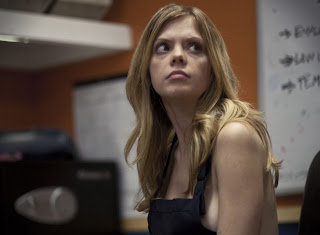Suspicion falls on the inside man, sharp-suited auctioneer Simon (James McAvoy, “Welcome to the Punch”), who swears while his fingernails are worked on with a Stanley knife that he has no memory of where he stashed the canvas prior to the handover. His excuse seems feasible: he was, after all, given a near-fatal bonk on the head during the final moments of the heist and, when taken to hospital, had a hole drilled deep into his skull. Things get trickier — and weirder — when Simon is taken to see Dr Elizabeth Lamb (Rosario Dawson, “Sin City”), a high-street hypnotherapist who agrees to trawl through Simon’s mind and extract the painting’s location in exchange for a cut of the loot. But when Simon is put under and his subconscious is rooted around in, the situation proves more complicated than previously thought, this gripping crime caper swiftly transforming into a head-spinning, brain-scrambling mystery where the line separating fantasy from reality becomes a deceptive blur.
It is a concept that naturally and dangerously evokes Christopher Nolan’s dream-hopping 2010 blockbuster “Inception” and Michel Gondry’s memory-wiping 2004 indie romance “Eternal Sunshine of the Spotless Mind,” but “Trance” is more twisted than both of those science fiction masterworks, traveling down unexpected paths where the darkest of secrets are unearthed. Screenwriters Joe Ahearne and John Hodge, adapting from Ahearne’s little-seen 2001 TV movie of the same name, revel in unravelling the plot’s countless twists and turns, while Boyle is clearly having a ball as he infuses the film with the same spunk and energy we’ve come to expect from him since his morbidly comic feature debut, 1994’s “Shallow Grave.”
Speaking of which, “Trance” has at its centre a similarly tumultuous character dynamic to that mid-90s Brit hit: once again we have a trio of self-centred, money-grubbing back-stabbers, none of whom we trust, nor particularly like. Though he is our narrator, the mentally damaged and double-crossing Simon is a wholly unreliable one, just like the increasingly psychotic, power-drilling attic-dweller played by Christopher Eccleston. Cassel, in typically seedy — but smoothly charismatic — badguy mode, at first glance appears to be the most straightforward of the three, but upon closer inspection we begin to wonder if this sadistic gangster is so repulsive after all. But the standout of the three is Dawson, who oozes raw sex appeal as the seductive and manipulative femme fatale of this knotty neo-noir whom we sense from the get-go knows more than she’s letting on; like her two male co-stars, and indeed the film itself, Dr Elizabeth Lamb is a beguiling figure shrouded in intriguing mysteries.
This is the first film Boyle has manned since his triumphant opening ceremony to the 2012 Olympics turned a whole nation’s frown upside down. Those seeking out the film based solely on his newfound national treasure status are in for a shock, what with the film’s garish explosions of sex, violence and full-frontal nudity, as well as, in one rather alarming fantasy scene, the sight of a character having the top half of his head blown off, picking himself up and then continuing to speak. If there’s anything to be said against the film, it would be that it is perhaps a little hollow and that the story, with its mounting revelations, is a little convoluted. But like the greatest of cinema’s directors, Boyle keeps us hypnotised at every turn, eager to see how the puzzle pieces will fit together — even at the end, when the puzzle is complete, we’re still not sure what it is we’re looking at.
8/10











